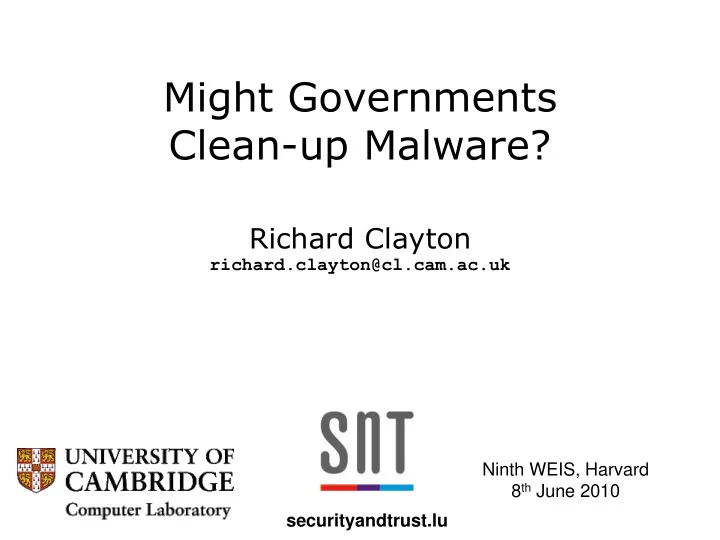

Might Governments Clean-up Malware? Richard Clayton richard.clayton@cl.cam.ac.uk Ninth WEIS, Harvard 8 th June 2010 securityandtrust.lu
Technical stuff • Malware (“malicious software”) aka virus, worm, trojan • Software running on end user machine under criminal control • Machine ends up in botnet and sends spam, participates in DDoS, commits click fraud etc, etc; and usually runs a keylogger (stealing user credentials for banks, webmail etc, etc) • Fix by stopping all malware processes, fixing up registry removing all executables, restoring AV etc. Can be really easy; or it may be simpler/safer to rebuild the system from scratch • Malware detected by remote sites (monitoring spam etc, or monitoring the botnet C&C systems) • Reports have to go to the ISP, because only they can translate IPaddr/port/time into identity of compromised customer
What do ISPs do with reports? Pass to customer • Customer then has to clean up malware Internet free scanners (if reachable, and genuine!) friends/family may do more harm than good $ computer shop specialist support $$$ “Geek Squad” generic support $$ new machine 8% in 2006 survey $$$$$$$ • ISP technical support not capable or willing to assist remote diagnosis problematic liability issues if make things worse Ignore • Cost of talking to customer equivalent to a whole year of profits not quite true (see footnote!) but more true than false
A government scheme • ISP delivers report to customer (perhaps under duress?) • Customer fixes it themselves, or uses Official Scheme • Scheme uses a contractor, but Government subsidises cost • Customer still pays $20- $30 (to avoid a “moral hazard”) • Contractor cleans up machine • Everyone happy • So what tender price should the contractor put in ? • And what is the scheme going to cost the taxpayer ?
Calculating the tender price • Cost of clean-up is currently $52 (Tango), $90 (Comcast) because of source of reports, likely to be economies of scale assume $70/clean-up and customer pays $30, hence $40 tender • BUT opportunity to sell the user some anti-virus software list price $70, trade discount 60% => $42 profit assume 50% take up, and can reduce tender price by $21! if do deal with AV vendor may do even better! • BUT some people will buy new machine assume $100 profit, but only 5% take up, reduce tender by $5 • BUT you get an relationship with a customer for future sales Google Adwords cost of “new laptop” is $1 to $4, assume $4 ! • Modelling this all correctly (the categories overlap!) an organisation confident in its sales ability would tender $11.05
What is the cost to the taxpayer? • Infection rates not really known, 1% too low, 10% too high! • Figures from Microsoft Malicious Software Removal Tool (MSRT) suggest that about 1% of machines need cleaning per month • Assume that half of all problems dealt with by customer (or by the IT department in a corporation) • Hence about 0.5% population would use service each month • With a government subsidy of $11.05 that means annual cost to the exchequer per computer is a mere 66 cents • Low price for an effective “public health” policy • For comparison: fluoridisation of water costs 92 cents per person per annum
Should the government be involved? • Not unreasonable for government to care about “public health” • Should make scheme more trustworthy for end-users and of course the subsidy makes it cheaper! • May make it easier to pressure ISPs to act • But governments can be inefficient albeit their role limited to choosing contractor • ISPs already self-organising initiatives in Germany, The Netherlands and Australia (trying to prevent the cost affecting price competition) Comcast has gone it alone (so far) in the USA • Your politics will determine if it is either „obvious‟ or anathema!
Summary • Malware is bad! • Much is spotted by its effect on the wider Internet • Only ISPs know who was using the IP address • Incentives act to discourage ISPs passing reports to end-users • Paper outlines a Government subsidy to clean-up malware • Subsidy would be less than might be naively expected • Just such a scheme is “being evaluated” by Luxembourg Ministry of Economics but to no effect so far • Discuss !
Might Governments Clean-up Malware? http://www.lightbluetouchpaper.org securityandtrust.lu
Recommend
More recommend